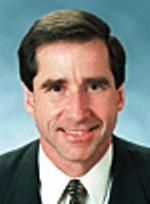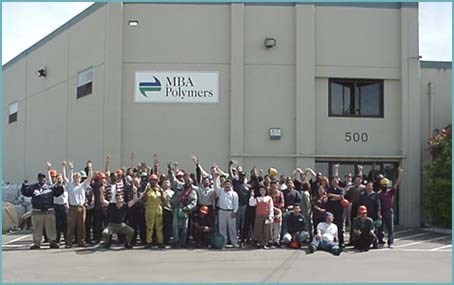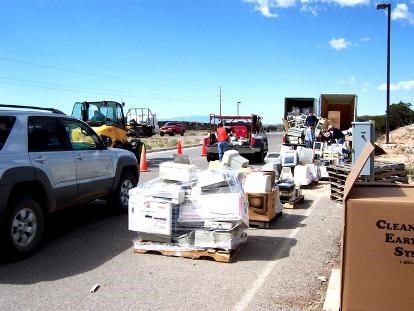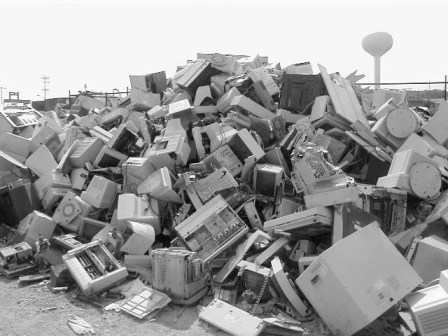 |
Michael Biddle was once known as a bit of a mad scientist around his suburban California neighborhood.
Chock full of scales, sizing screens, old computers and discarded fax machines, lab equipment, and even a wet chemistry arrangement, the two-car garage of his modest home quickly became the talk of the town. Or at least of his neighbors.
It was the early 1990s and Biddle, barely into his thirties, was eager to use his degrees - a B.S. in chemical engineering and a Ph.D. in polymer science and plastics engineering from Case Western Reserve. Relatively fresh out of college - having received his doctorate in 1987 - Biddle knew a thing or two about research, and a whole lot about putting in extra long hours.
While working at Dow Chemical in the Bay Area, Biddle, who had been hired to research high-tech composites, was convinced that recycled plastics were the real wave of the future. His bosses initially rejected the notion, as the recycling industry was still young and teeming with insecurities, but Biddle, unshaken, was able to secure government and private funding at Dow. When, in 1992, the company shut down the lab Biddle worked in, convinced that his intuition would pay off - or at least help make an ecological difference -- he began to pursue his passion for recycling, full time.
He served as an independent consultant for various industries on the science of plastics recycling, and in the process, learned more about the various technologies and processes used for sorting, crushing, and recycling of metals and other materials, than he ever imagined. Brimming with knowledge and the enthusiasm he had felt since his boyhood days of religiously turning out lights around his parents' home to conserve energy -- Biddle set up a lab in his garage to the chagrin (and in a few cases, pride) of his curious neighbors.
By 1994 Biddle was convinced the time had come to expand his pilot project. In what others might consider a high-risk venture, Biddle took out a one million dollar loan from the state of California, and expanded his research into a 10,000 square foot location in Berkeley, where he and four employees worked tirelessly to learn all they could about the recycling of complex plastics.
 |
| MBA Polymers |
Within a few years Biddle decided to expand his own company rather than sell the wealth of information he had accumulated. It was 1997 and by then the green movement was truly emerging and he was able to secure 30 million from a variety of investors to start his own company. This was an incredible feat in and of itself, but especially so coming from an individual who only a few years prior had been doing his research in his garage, using lab equipment he'd made himself or bought at auctions.
Biddle's company, MBA Polymers, only twelve years old, is already considered the most advanced durable goods recycler, and one of the world leaders in the development of recycling technologies.
 |
| An e-waste recycling drive in Santa Fe, New Mexico |
MBA ventures into lands where few recyclers - who stick to the safer world of steel and aluminum - dare to tread: "complex waste streams" from automobiles and the e-waste of discarded electronics like computers, cell phones and fax machines. Considered a near-impossible feat by many, Biddle's patented systems, housed inside a 45,000 square foot recycling plant in Richmond, California, are able to separate and recycle the various components of these complex machines, picking apart and extracting metals through magnets and eddy currents, dislodging contaminants like foil and foam and wood with air classifiers, and most complex of all - separating the various plastics by their polymer (chemical) types and grade, a feat which has stumped researchers for years. The process ultimately results in the creation of three important plastics - polystyrene, polypropylene, and ABS, that can be used in the mass market.
 |
Now a profitable business, both financially and ecologically, it's the separation of this "plastic trash" - these complicated blends of various plastics used in certain products - that sets MBA apart in the recycling world. E-waste that was once considered automatic landfill fodder now has a chance to become reborn into plastic once again. The good news comes not a moment too soon for impoverished nations where e-waste is often sent unscrupulously - under the guise of reuse "to bridge the digital divide." In fact, India and Asia are currently coined by some, including Greenpeace who has launched a campaign against e-waste, as the "dumping ground of the West" for e-waste. Containing an average of 6 pounds of lead each, computer and television displays, for example, release the toxin into the environment when these items are illegally disposed and crushed or incinerated in landfills. Other electronic goods including computers and cell phones contain a variety of hazardous materials including mercury, cadmium, PVC plastics, and more. In addition to being an eyesore to communities housing it, and over-flowing landfills near and far, e-waste is a threat to the environment, to those exposed for it outside of safe conditions (like Biddle's plant), and to the ecological future of the planet.
Biddle's dream is to recycle e-waste on a mass-scale worldwide and avert the earth of a potential ecological catastrophe. With his vision and guidance, it seems this dream could fast become a reality. MBA opened in China what is considered "the world's largest commercial-scale plastic recovery facility for durable goods," and nearly simultaneously another world-scale recycling plant in Austria.
Honored by the Tech Awards as a laureate, a prestigious distinction bestowed upon those 'using technology to benefit humanity,' Biddle had this to say upon receiving his award in Fall of 2006:
"Not only does our technology keep a valuable resource from the landfills and incinerators around the world, it can save billions of pounds of greenhouse gases from entering the atmosphere, dramatically reduce water consumption, and save millions of barrels of oil every year. We are proud to demonstrate that environmental and economic benefits can and should coincide."
Page created on 8/7/2014 3:38:28 PM
Last edited 1/5/2017 9:42:36 PM
